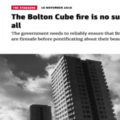
The government – that is, civil servants as well as ministers – have sought to impose rigid central control over the cladding crisis, and then not done it competently. The result is that resolution of the cladding crisis falls far short of that of Australia and, very likely, Scotland, which is following the Australian not the London government’s approach.
These two conclusions may be drawn from articles by LKP trustee and solicitor Liam Spender on Oxford University’s law faculty website.
For nearly 40 years up to the issue of Advice Notice 14 in October 2018, it was presumed that a building approved by building control met the requirements of Building Regulations in force at the date of construction. The Advice Notes up-ended that view.
Extra-statutory guidance and its role in relation to the Building Safety scandal – Part 1: Advice Notes
It soon become clear following the Grenfell Tower fire that many other high-rise residential buildings with cladding were also at risk. The government’s response has been to seek to make buildings safe by issuing instructions to building owners through extra-statutory advice notes (the “Advice Notes”).
The Advice Notices are also retrospective, applying higher standards than those found in current Building Regulations for buildings below 18 metres. The Advice Notes impose a requirement of “limited combustibility” on external walls of buildings above 18 metres that was not explicit in Building Regulations in force before 21 December 2018.
Mr Spender writes: “The Advice Notes were issued without any attempt to count the number of buildings affected. There was no cost-benefit analysis of the government’s recommended removal and replacement of cladding. The Advice Notes avoided Parliamentary scrutiny that would accompany a bill or a new statutory instrument. The Advice Notes imposed ministers’ preferred solution on all buildings without demonstrating that it was necessary or cost-effective in all cases.”
Coupled with “guidance” from the National Fire Chiefs’ Council – which resulted in waking watch – the Advice Notices have impose billions of pounds of costs on leaseholders, even though ministers – including prime ministers – have said that they should not pay for build defects for which they had no responsibility.
There has been no national audit of affected buildings, or any consideration of how funding should be prioritised by risk.
Communities Select Committee view:
https://publications.parliament.uk/pa/cm5801/cmselect/cmcomloc/172/17203.htm#_idTextAnchor000
So many builds have been dragged into the crisis that should not have been, and the government cladding grants are being divvied up on a first come, first served basis: basically, who can fill in the civil servants’ forms best and fastest (with housing associations showing a predictable aptitude).
“The Australian states of New South Wales and Victoria adopted a radically different approach,” writes Mr Spender. “That approach involved the government inspecting thousands of buildings, instead of leaving it to individual building owners, as with the Advice Notes. Levels of risk were defined using the data from those inspections. Buildings were triaged using that data. Only the highest risk buildings have been forced to replace their cladding, as opposed to every building in England. Scotland recently announced it will adopt a version of the Australian approach.”
Extra-statutory guidance and its role in relation to the Building Safety scandal – Part 2: Leaseholder Consequences
The first part of this blogpost explains how Advice Notes have been issued post-Grenfell; this part looks at further fire safety guidance and the consequences of this and the Advice Notes for leaseholders. Waking Watch guidance The Building Regulations require that apartment buildings are constructed with compartmentation to prevent the spread of smoke and flame from one part to another.
Here Ted Baillieu, ex-premier of Victoria, in Australia, explains its approach:
Ted Baillieu, ex-pm of Victoria, tells London cladding leaseholders that Australians identified flats most at risk and sorted them out first (but there were loans to flat owners)





 New Capital Quay Litigation continues, with concern that repairs may still not meet Building Regulations
New Capital Quay Litigation continues, with concern that repairs may still not meet Building Regulations





















